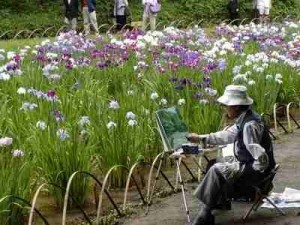 Lydia Minatoya’s lovely and thoughtful novel The Strangeness of Beauty is narrated by Etsuko, a woman straddling two worlds — the austere elegant world of her samurai family in Japan and the encroaching modern world. The book, set in the years between World War I and World War II, takes the form of Etsuko’s I-story, an autobiographical novel and ancient art that is given new life and urgency in the 20th Century. Etsuko explains,
Lydia Minatoya’s lovely and thoughtful novel The Strangeness of Beauty is narrated by Etsuko, a woman straddling two worlds — the austere elegant world of her samurai family in Japan and the encroaching modern world. The book, set in the years between World War I and World War II, takes the form of Etsuko’s I-story, an autobiographical novel and ancient art that is given new life and urgency in the 20th Century. Etsuko explains,
“critics have questioned the motivation behind the amateur I-Story. Often it seems so futile. Why would so many work so long to create novels meant for their eyes alone? The answer involves social upheaval — in which a sudden infusion of excessive education … has clashed with limits in opportunity, to turn a nation of habitual haiku writers half mad.”
She goes on to say that they are a nation of people dying to be understood, “roiling with confessional angst”.
Yet there is something else in Etsuko’s need to document and make sense of her life. She wants to capture myo — the strangeness of beauty — that is found in everyday living. Towards the end of the novel, Etsuko writes of a visit to famed iris gardens in Tokyo. She describes encountering dozens of amateur artists, “jammed” together, painting unremarkable paintings that look almost exactly the same. Contemplating these “Sunday painters,” Etusko asks, “Do you laugh, cry or applaud?”
I am a Sunday Painter, an I-storyteller, a blogger with a miniscule audience in a big, noisy world. Oftentimes, I feel a mild sense of despair over my lack of talent or panic with each approaching deadline. I’m not going to set the world on fire with my musings on Miss Piggy or Liz Phair, but I am keeping something lit within me. Etsuko goes on to say:
“To me these Sunday painters represent myo — the strangeness of beauty — an idea that transcendence can be found in what’s common and small. Rather than wishing for singularity and celebrity and genius (and growing all gloomy in its absence), these painters recognize the ordinariness of their talents and remain undaunted. It’s the blessings in life, not in self, that they mean to express. And therein lies the transcendence. For as people pursue their plain, decent goals, as they whittle their crude flutes, paint their flat landscapes, make unexceptional love to their spouses — in their numbers across cultures and time, in their sheer tenacity as in the face of a random universe they perform their small acts of awareness and appreciation — there is a mysterious, strange beauty.”Novelist Esther Freud recently wrote, “For many of us, our lives our littered with regrets over unfulfilled ambitions … It’s what people don’t do that they regret, rarely what they did … Often these things are worth doing just for the pure pleasure of doing them.” And, so I applaud. I applaud middle-aged lawyers and accountants who gather once a week in the garages of their well-kept suburban homes to practice Metallica or Rolling Stones covers, getting ready for occasional shows in bars or county fairs; I applaud community theaters putting on Shakespeare and The Sound of Music and teenagers in small English market towns who attempt American accents for their school’s production of Grease. I feel a sense of kinship with people all over the world who will take their sketchbooks into museums today to draw, lovingly covering the territory of the masters. I applaud their — our –yearning to participate, to say I am here and I see and am part of the strange beauty of life.

I love this message, Heidi. I was just watching an interview with Viggo Mortensen where he made the point that all arts are connected, and they call for us to participate: to express ourselves through them. Our society tells us that we should only play our piano in public if we’re up to concert standard, and only share our drawings if they rival the Masters. You’re right that we need to draw; we need to sing.
All through my teenage years I played in a band, under the happy illusion that we had a shot at making it famous. Then I moved on, ‘grew up’, and gradually played less and less often. Now I’ve decided to pick up the guitar again, I remember just how important it was through those years, in creating wellbeing and happiness for me.
It is so easy to let this fear — this I am not good enough — keep us from following our dreams. I gave up acting and singing because I thought I wasn’t pretty or talented enough, gave up writing at various times because it wasn’t great, passed up on opportunties, jobs. But, the doing is where the real joy comes from. We are taught that beauty is something that is rare and exclusive, but when I really look, I see it everywhere.
I love your last sentence here, especially. Makes me think of perhaps my favourite scene out of any film.
Heidi, there’s something about Japanese culture that draws me into a desire to see the world differently (not sure if you saw my two posts that also were titled with Japanese words). Strange beauty. It’s the pleasure you get from doing thing simply because it pleases you. The world be damned. <-- this is a philosophy for people who know anonymity and accept it. No need for dreams of crowns and principalities in the life to come.
Matt, I do remember your posts. In fact, my son’s class has been discussing wabi sabi and I was talking about the concept with his teacher, not quite placing where I had read about it before (your post and briefly in The Strangeness of Beauty). Anyways, the conversation inspired me to take another look at Minatoya’s novel and some of my favorite passages. My son’s teacher has an amazing book with beautiful paintings in it about wabi sabi that you should check out, it’s called Wabi Sabi by Mark Reibstein with illustrations by Ed Young.
It is this reverence for the small, the simple, the uncelebrated that has fueled my desire to spend as much time as possible around kids all of my life.I have always found a way to be near them even if they are children I have just met as I stand in line waiting to pay for my groceries. It is the unexpected discovery that makes me find my greatest friendships with kids. Today I was wating in line to buy hair dye at the drugstore standing behind a beautiful black eyed little girl with lots of braids and barrettes who looked to be around 3. She picked up a bottle of Tylenol and handed it to me as she said No and I instinctively shook my head no and said “Danger” Just like the sunday painters you have to be prepared to grab those fleeting chances to feel a wholeness with the universe. When my husband was Bishop I realized being the “pastors wife” was a lonely spot. Mostly keeping your head down, mine bright red and spikey. On Sundays I felt especially lonely and noticed that young moms sitting around me in the chapel were losing their will to live. So every Sunday I packed a diaper bag for who ever might need it. I filled it with forbidden gum, markers and tiny toys as well as paper and favorite books. I got most of my supplies from the dollar store and got in the habit of giving away any item a child seemed attatched to. It made church bareable for me and I still do it to this day. I never know when I might get a chance to connect but if I do I am ready.
Janae, what a great thing you do for parents at church on Sunday!! I’m going to remember this.
Maybe your article best describes why I feel so compelled to sew. I want to make something that will last. Clean dishes and clean laundry doesn’t last, but I have these visions of colors and fabrics. Now, I’m not into fashion, in fact my husband cuts my hair in a straight line just below my shoulder blades. But, I love to sew. Sometimes the beauty is so strange when I get halfway into a project that I put it back in the box with my other unfinished projects. I recently made a dress for my daughter and when I finished I declared it to be an old-lady frock. I begged her not to wear it suggesting that we could put it with her play clothes. The print was too big, it didn’t work with the pattern. My daughter is six and wore it one Sunday believing that she was a princess in a fancy gown. It touched me that she loved it so. But, when she got home I hid in in my closet.
I am a Sunday painter with plain, decent goals. And your words make me feel even more excited to start the next dress for my daughter. Thanks, Heidi! ~Josi